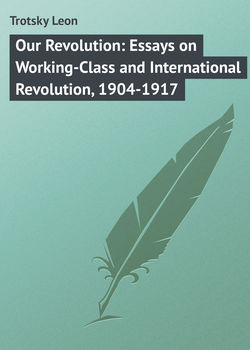Читать книгу Our Revolution: Essays on Working-Class and International Revolution, 1904-1917 - Trotsky Leon - Страница 4
THE EVENTS IN PETERSBURG
ОглавлениеThis is an essay of triumph. Written on January 20, 1905, eleven days after the "bloody Sunday," it gave vent to the enthusiastic feelings of every true revolutionist aroused by unmistakable signs of an approaching storm. The march of tens of thousands of workingmen to the Winter Palace to submit to the "Little Father" a petition asking for "bread and freedom," was on the surface a peaceful and loyal undertaking. Yet it breathed indignation and revolt. The slaughter of peaceful marchers (of whom over 5,000 were killed or wounded) and the following wave of hatred and revolutionary determination among the masses, marked the beginning of broad revolutionary uprisings.
For Trotzky, the awakening of the masses to political activity was not only a good revolutionary omen, but also a defeat of liberal ideology and liberal tactics. Those tactics had been planned under the assumption that the Russian people were not ripe for a revolution. Trotzky, a thorough revolutionist, saw in the liberal movement a manifestation of political superstitions. To him, the only way to overthrow absolutism was the way of a violent revolution. Yet, when the liberals proudly asserted that the revolutionary masses of Russia were only a creation of the overheated phantasy of the revolutionists, while the movement of the well-to-do intelligent elements was a flagrant fact, the Social-Democrats had no material proofs to the contrary, except sporadic outbursts of unrest among the workingmen and, of course, the conviction of those revolutionists who were in touch with the masses. It is, therefore, easy to understand the triumph of a Trotzky or any other Socialist after January 9th. In Trotzky's opinion, the 9th of January had put liberalism into the archives. "We are done with it for the entire period of the revolution," he exclaims. The most remarkable part of this essay, as far as political vision is concerned, is Trotzky's prediction that the left wing of the "Osvoboshdenie" liberals (later organized as the Constitutional Democratic Party) would attempt to become leaders of the revolutionary masses and to "tame" them. The Liberals did not fail to make the attempt in 1905 and 1906, but with no success whatever. Neither did Social-Democracy, however, completely succeed in leading the masses all through the revolution, in the manner outlined by Trotzky in this essay. True, the Social-Democrats were the party that gained the greatest influence over the workingmen in the stormy year of 1905; their slogans were universally accepted by the masses; their members were everywhere among the first ranks of revolutionary forces; yet events developed too rapidly and spontaneously to make the leadership of a political organization possible.
